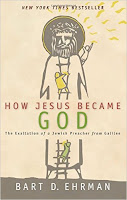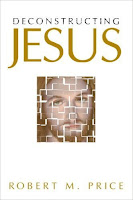by Catherine GiordanoI started writing on HubPages a little more than a year ago. HubPages is a platform for writers to write on whatever subject they wish. Writers can earn a small amount of money based on how many views or “clicks” they get. The earnings are nice, but they are so small that writing for HubPages is more of a hobby than a job. I always wanted to be a writer and now I am. I have developed a bit of a following and that is very gratifying to the ego.
When I first started on HubPages, the other writers were
very friendly and helpful. They told me that the key to success was “find your
niche.” They meant that I should find a topic that I knew something about and
that I felt “passionate” about, and concentrate my efforts on that topic. For a
long time, I just wrote about everything, but then I stumbled upon my niche.
I've been an atheist pretty much all my life. I've belonged to various atheist groups and I founded the Free Inquiry Society of Central Florida and was the president of the group for about 12 years. At the time, this was the only atheist group in Central Florida; now there are several. That is progress.
Since I know a lot about religion (from an atheist's vantage point) and it is a subject I am interested in, I started writing about it. I’ve been doing a lot of research about Jesus and whether or not Jesus ever existed, not as a god, but as a man. My first hub on this went viral (in a modest way) and has gotten tens of thousands of hits. Here is the link to the article.
I've been an atheist pretty much all my life. I've belonged to various atheist groups and I founded the Free Inquiry Society of Central Florida and was the president of the group for about 12 years. At the time, this was the only atheist group in Central Florida; now there are several. That is progress.
Since I know a lot about religion (from an atheist's vantage point) and it is a subject I am interested in, I started writing about it. I’ve been doing a lot of research about Jesus and whether or not Jesus ever existed, not as a god, but as a man. My first hub on this went viral (in a modest way) and has gotten tens of thousands of hits. Here is the link to the article.
Like many people, and the majority of biblical scholars, I
thought there was a man called Jesus in first century Judea or maybe several
men whose stories were conflated. As I researched the topic I came to believe that
I was wrong. It is very likely that Jesus did not exist.
There are books on both sides of this issue. Here are a few
books you might like to look into. Click the links for more detailed book
reviews.
Here are a few books that support the theory that Jesus did
exist.
Zealot: The Life and Times of Jesus of Nazareth
Zealot by Reza Aslan is a meticulously researched biography that challenges long-held assumptions about the man we know as Jesus of Nazareth.
Zealot by Reza Aslan is a meticulously researched biography that challenges long-held assumptions about the man we know as Jesus of Nazareth.
Bart Ehrman explains that the
original disciples did not believe that Jesus was God—and it is not what Jesus
claimed about himself. This book explains the evolution of a belief that looked
very different in the fourth century than it did in the first.
And here are a few books that support the theory that Jesus did not exist.This school of thought is relatively new. It is called mythicism.
 |
| CLICK HERE |
 | |
| CLICK HERE |
The Jesus Puzzle: Did Christianity Begin with a Mythical Christ? Challenging the Existence of an Historical Jesus
Earl Doherty
provides a richly-detailed and entertaining account of how
Christianity began without an historical Jesus of Nazareth, who existed only on
the pages of the Gospels. He
provides a full and comprehensive survey of the early Christian
record, the Pauline epistles, the gospels, the second century apologists, along
with Jewish, Gnostic, and Greco-Roman documents of the time. He provides
historical context with a discussion of the philosophy of the era, the pagan
mystery cults, and other historical events. He was one of the first scholars of
the modern mythicism school of thought. A great read for the general public and
scholars alike.
On the Historicity of Jesus: Why We Might Have Reason or Doubt
Richard Carrier re-examines the whole premise that Jesus existed as a real person and concludes that the Jesus story as we know it today is a blending of the historical, mythical, and theological. Carrier finds compelling reasons to suspect that the view of many religious scholars that Jesus actually existed is incorrect.
David Fitzgerald sheds light on ten beloved Christian myths.The author gathers evidence
from historians across the theological spectrum, and shows how it points to a
Jesus Christ created solely through the allegorical alchemy of hope and
imagination; a messiah that is a theological construct-- in short, a Christ
that is pure myth.
Deconstructing Jesus
Robert Price, professor of scriptural studies at the Johnnie Colemon Theological Seminary, shows how the Jesus Christ of the gospels is very likely a fictional amalgam of several first-century prophets and messiahs, as well as of purely mythic Mystery Cult redeemers and Gnostic Aions.
 |
| CLICK HERE |
 |
| CLICK HERE |
 |
| CLICK HERE |
Some people attempted to refute my thesis by Josephus and other first century writers had written about him. I researched this and found that these mentions were mainly forgeries or so vague as to be meaningless.I wrote about my findings in the following article.
New
Testament scholar Robert M. Price, one of America's leading authorities on the
Bible, has assembled in his book evidence that shows that almost the entire
"biography of Jesus" is a conscious reworking of earlier literature.
Bart Ehrman is a Biblical scholar who believes that Jesus Christ existed as a real person, but even he recognizes that many books of the New Testament are not only not written by people to whom they are attributed, but that they are deliberate forgeries.
 |
| CLICK HERE |
 |
| CLICK HERE |
My most recent article set out to explore the similarities between the myths and the mystery cults popular in the Roman Empire of the first century. It turns out that some of the most frequently mentioned similarities are the result of over-zealous atheists making false claims. Nonetheless, I found many similarities that were indeed true.Here is the link to the article.
I’ll add to this list of articles as fast as I can. I hope to tackle the
question about how the gospels were written very soon. Stay tuned.
Writing on this topic has brought me both praise and a lot
of harsh criticism. Even the mere suspicion that a historical Jesus did not
exist as god or man can tumble the typical Christian’s entire worldview. This
is very threatening. However, the answer to the question, “Did Jesus exist?” makes
no real difference to me. It is only an intellectual puzzle. Whether the answer
is yes or no, my life will not change at all. If the answer is yes, I will
remain an atheist because I do not believe in God. If the answer is no, I still
remain an atheist.


No comments:
Post a Comment
Please let me know what you think by posting a comment.